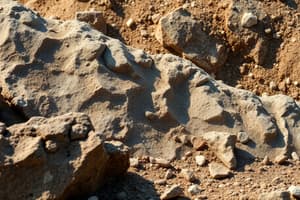Podcast
Questions and Answers
Which of the following best exemplifies a quantitative measurement in scientific research?
Which of the following best exemplifies a quantitative measurement in scientific research?
- Measuring the pH of a soil sample using a calibrated meter. (correct)
- Categorizing cloud formations based on visual appearance.
- Estimating the age of a tree based on its size.
- Describing the texture of a leaf as smooth.
Why is falsifiability considered a crucial characteristic of scientific claims?
Why is falsifiability considered a crucial characteristic of scientific claims?
- It allows scientific ideas to remain unchallenged and unquestionable.
- It ensures that scientific theories are never proven wrong.
- It enables scientists to rigorously test and refine hypotheses, promoting reliability. (correct)
- It protects scientific theories from being questioned by the general public.
What distinguishes science from pseudoscience, according to the provided information?
What distinguishes science from pseudoscience, according to the provided information?
- Pseudoscience encourages falsifiability, while science avoids it.
- Science readily accepts subjective observations, while pseudoscience rejects them.
- Science avoids testable explanations, while pseudoscience embraces them.
- Pseudoscience relies on personal feelings, while science relies on objective evidence. (correct)
A researcher is studying the behavior of a specific animal species. Which approach would demonstrate a commitment to minimizing bias?
A researcher is studying the behavior of a specific animal species. Which approach would demonstrate a commitment to minimizing bias?
What does it mean for a hypothesis to be 'falsifiable' in the context of scientific research?
What does it mean for a hypothesis to be 'falsifiable' in the context of scientific research?
Which of the following statements best describes deductive reasoning?
Which of the following statements best describes deductive reasoning?
What was a primary factor that contributed to the stall of scientific progress in Europe after the fall of the Roman Empire?
What was a primary factor that contributed to the stall of scientific progress in Europe after the fall of the Roman Empire?
How did Galileo's observations of Jupiter's moons challenge the geocentric model?
How did Galileo's observations of Jupiter's moons challenge the geocentric model?
Why is Galileo Galilei often considered the first modern scientist?
Why is Galileo Galilei often considered the first modern scientist?
In what area did Johannes Kepler expand on Copernicus' heliocentric model?
In what area did Johannes Kepler expand on Copernicus' heliocentric model?
What is the primary distinction between a scientific hypothesis and a scientific theory?
What is the primary distinction between a scientific hypothesis and a scientific theory?
What is the role of peer review in the scientific process?
What is the role of peer review in the scientific process?
Which of the following best describes the purpose of replication in scientific research?
Which of the following best describes the purpose of replication in scientific research?
Which of the following describes the application of deductive reasoning, as pioneered by Aristotle?
Which of the following describes the application of deductive reasoning, as pioneered by Aristotle?
What is the most important characteristic that distinguishes scientific conclusions from those reached in pseudoscience?
What is the most important characteristic that distinguishes scientific conclusions from those reached in pseudoscience?
Flashcards
Objective Evidence
Objective Evidence
Information that is unbiased and the same for anyone observing.
Subjective Observation
Subjective Observation
A personal interpretation influenced by individual feelings or beliefs.
Quantitative Measurements
Quantitative Measurements
Data expressed in numerical form, allowing precise analysis.
Falsifiability
Falsifiability
Signup and view all the flashcards
Pseudoscience
Pseudoscience
Signup and view all the flashcards
Scientific Method
Scientific Method
Signup and view all the flashcards
Hypothesis
Hypothesis
Signup and view all the flashcards
Peer Review
Peer Review
Signup and view all the flashcards
Theory vs Hypothesis
Theory vs Hypothesis
Signup and view all the flashcards
Empiricism
Empiricism
Signup and view all the flashcards
Deductive Reasoning
Deductive Reasoning
Signup and view all the flashcards
Inductive Reasoning
Inductive Reasoning
Signup and view all the flashcards
Geocentric Model
Geocentric Model
Signup and view all the flashcards
Heliocentric Model
Heliocentric Model
Signup and view all the flashcards
Galileo Galilei
Galileo Galilei
Signup and view all the flashcards
Study Notes
Scientific Method and Geology
- Science seeks to understand natural patterns and processes using objective evidence.
- Objective observations are unbiased and consistent across individuals.
- Subjective observations are based on personal feelings and beliefs.
- Quantitative measurements (numerical) are preferred over qualitative descriptions (e.g., red, heavy).
- Scientific claims are falsifiable; hypotheses can be tested and proven wrong.
- Reliable scientific theories emerge after rigorous testing and elimination of alternative explanations.
- Falsifiability distinguishes science from pseudoscience.
- Pseudoscience lacks the scientific method and may appear scientific but is not.
- Science is a social process, with scientists sharing ideas and undergoing peer review.
- Peer review helps identify errors and misinformation in research.
- The scientific method's key is objective evidence, not personal opinion.
- The method involves identifying a problem, forming a hypothesis, conducting experiments, collecting and analyzing data, and sharing results.
History of Scientific Thought in Geology
- Early scientific thought in Greece emphasized empirical thinking, including deductive reasoning.
- Deductive reasoning starts with general principles to deduce specific conclusions.
- Inductive reasoning starts with observations to form general principles.
- The spread of Greek knowledge continued with Rome.
- Science in the Middle East thrived during the Medieval period.
- The Renaissance saw a shift toward empirical observations and experimentation, challenging Aristotelian views.
- Ptolemy's geocentric model, placing Earth at the center of the universe, was challenged during the Renaissance.
- Nicolaus Copernicus proposed the heliocentric model, with the Sun at the center.
- Johannes Kepler and Galileo Galilei supported the heliocentric model and questioned established ideas using observations.
Uniformitarianism and Plate Tectonics
- James Hutton's principle of uniformitarianism suggests natural processes have been consistent throughout Earth's history.
- The principle supports slow geologic processes over sudden catastrophic events.
- Uniformitarianism was opposed by theories like catastrophism.
- The idea supporting the continents moving is called Continental Drift.
- Alfred Wegener's continental drift hypothesis was initially dismissed.
- Advances in submarine technology helped support and refine the theory, paving the way for the theory of plate tectonics.
Geology and Society
- Geology studies Earth materials and processes.
- It's vital for managing natural resources, understanding environmental impacts, and mitigating natural hazards.
- Modern society depends on geologic resources such as fossil fuels, metals, and water.
- Geologists study how to sustainably manage these resources.
- Geology studies natural hazards like landslides, earthquakes, and volcanic eruptions.
- Earth System Science views the Earth's interconnected systems and processes.
The Rock Cycle
- The rock cycle describes the formation, transformation, and destruction of rocks.
- It involves the processes of crystallization, weathering, erosion, deposition, lithification, and metamorphism.
- Igneous, sedimentary, and metamorphic rocks are linked in a cyclical process.
Earth's Structure
- Earth's layers include the crust, mantle, and core based on chemical composition and physical properties.
- The lithosphere is part of the upper mantle and outermost layer, composed of tectonic plates that move.
- The asthenosphere is the underlying mobile layer.
- Earth's age is approximately 4.54 billion years old.
Geologic Time
- Geologic time is measured in eons, eras, periods, and epochs.
- The Phanerozoic Eon (visible life) is the most recent time period with a large number of multicellular organisms.
- The eras from oldest to youngest are Paleozoic, Mesozoic, and Cenozoic.
- Studying deep time helps understand Earth's long history and slow geologic processes.
Scientific Evaluation
- Scientific conclusions are based on objective evidence.
- Credibility of information requires clear and verifiable methods and data.
- Peer review and replication are important for validating science.
- Science is a continuing process of discovery and refinement.
- Science denial exploits scientific uncertainty and personal attacks.
Studying That Suits You
Use AI to generate personalized quizzes and flashcards to suit your learning preferences.




